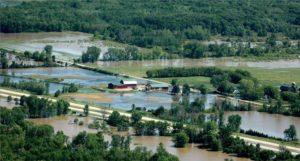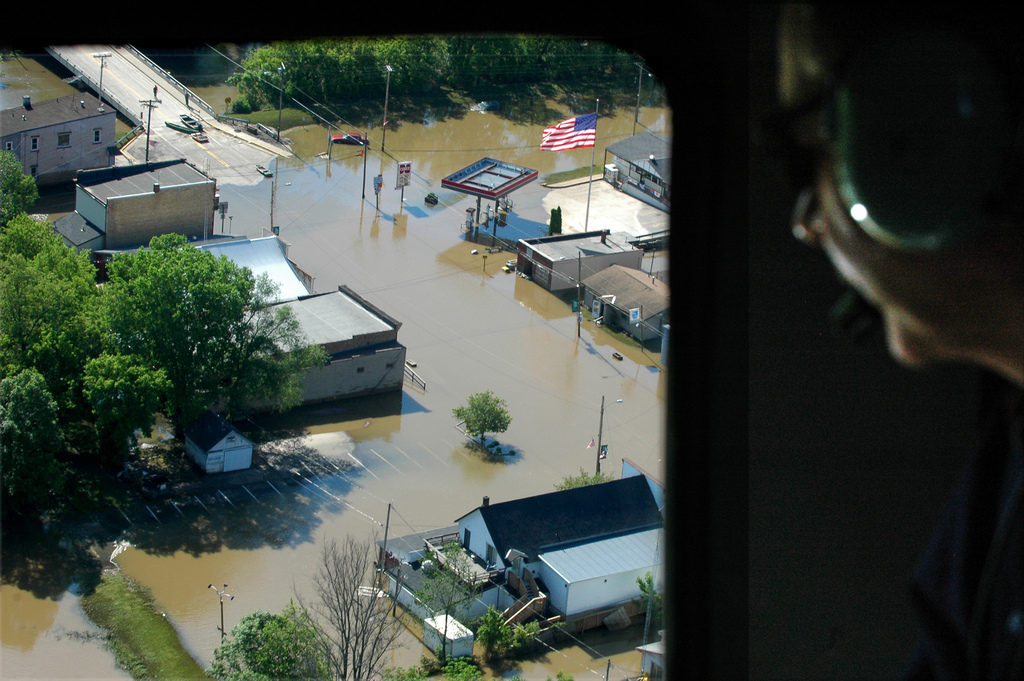Ten years ago, southern Wisconsin was a wet mess.
Dams failed, roads washed out, basements filled, businesses were lost, levees were breached and farmland flooded. The most dramatic event happened the day before when Lake Delton drained into the Wisconsin River, taking with it five homes and millions of dollars in business from the resorts and other businesses that rimmed the lake or relied on its water.

The torrential rains of a decade ago killed three people, caused $763 million in damage in 31 of the state’s 72 counties and remains fresh in the minds of those who endured the sleepless nights and the associated worry about family, neighbors, farm animals, crops, property and livelihoods.
But amid the chaos came innovation and cooperation – something that not only paid off in 2008 for the Columbia County village of Pardeeville, but which continues to pay dividends today, the Wisconsin State Journal reported.
Without the massive rainfall and rising waters from Park Lake, an impoundment of the Fox River, it’s unlikely this village would have a new ice cream shop and car dealership. There wouldn’t be a new concrete spillway to better fend off heavy rains, and there most certainly wouldn’t be Volunteer Park, named after the scores of residents, campers and jail inmates who helped build and maintain a temporary flume across Highway 22.
The man-made river, designed with sandbags and 4,000 feet of heavy plastic sheeting, was built to alleviate the pressure of water from rain-swollen Park Lake that threatened to destroy the dam and hydroelectric plant that has been generating power here since 1901. The spur-of-the-moment project was a success at the time, and economic development has followed.
“It could have been catastrophic for a community of this size and ruined the village,” said Mike Babcock, a lifelong resident of Pardeeville and a retired deputy from the Columbia County Sheriff’s Office. “Everything has been a bonus since the flood. (Without the flood,) I think it stays stagnant, and I don’t think the interest in developing the properties really would have been there.”
In 2016, Babcock and his wife, Carol, purchased land just north of the temporary flume site and have built a 3,000-square-foot building that houses Carol’s Cones in the front and a car prep area for Spring Lake Sales, a used car dealership, in the back. The businesses are next to Volunteer Park and overlook Spring Lake to the west. A public pier across Highway 22 provides a convenient pit stop for boaters on Park Lake who crave an ice cream cone or a hot dog. The business sells between 80 and 100 tubs of Cedar Crest Ice Cream a week.
“Our location is huge,” said Carol Babcock, whose business is on the site of the former Brain Freeze ice cream shop, which was formerly the Lunch Box and owned by Rita Fenske, who served up fried egg sandwiches to first responders during the flood.
Across the street, next door to the public pier, Cortney and Cameron Oswald are making big improvements to what for years was a gas station but in the last four years has been home to a liquor store and bait shop. In 2017, the Oswalds, who had been living in Seattle, bought what is now Pardeeville Water Sports and Lakeside Liquor. They have reorganized the liquor store and are working on a plan to add new bathrooms and a restaurant and bar with rooftop seating overlooking Park Lake. Their business also rents kayaks, canoes and fishing and pontoon boats.
“We saw the diamond in the rough,” said Cameron Oswald, whose wife is a Pardeeville native. “We knew the ice cream store was going in, and this was our chance to buy something with a lot of potential.”
Pardeeville is a village of about 2,115 people located about 11 miles east of Portage. Major employers include Everbrite, an electronic sign and scoreboard manufacturer, and Sonoco, a company that provides packaging solutions for other businesses. In the downtown, Hometown Pharmacy will soon move into a larger space, there’s a new cafe and a trendy secondhand boutique store. The school district is also making improvements after voters in April approved an $11.9 million referendum for improvements at the high school.
Robert Becker was a trustee on the Pardeeville Village Board during the 2008 flooding and is now village president.
He said the community is much better prepared today than it was 10 years ago to face potential flooding after making improvements thanks in part to more than $268,000 in state and federal assistance.
“It’s amazing what water can do,” said Becker, a retired banker who has a passion for riding motorcycles. “I would have never dreamed that it did what it did.”
In 2008, some areas of the state received up to 14 inches of rain, floodwaters displaced more than 2,600 people, and volunteers provided more than 77,000 meals at mobile and fixed feeding sites, according to Wisconsin Emergency Management officials.
More than 850 local and state government agencies and 24,000 individuals applied for assistance from the Federal Emergency Management Agency, which awarded $104.5 million to state residents. The rainfall followed a wet 2007 and record-breaking snowfall in the winter of 2007-08, which primed the region for flooding.
The floods of 2008 led the village of Gays Mills in Crawford County to abandon several businesses and homes in the Kickapoo River floodplain and move them to higher ground out of the reach of future floods.
In Spring Green, the Prairie House Motel along Highway 23 was a total loss, and a nearby neighborhood was condemned, with 14 houses removed.
In Jefferson County, officials spent $8.8 million in local, state and federal money to buy and remove 50 properties from flood zones, while River’s Edge Meat Market & Catering was moved to South Main Street in Jefferson from its former site just feet from the Rock River.
“It’s a part of our history,” said Tom Diehl, co-owner of Tommy Bartlett, the popular ski show based on Lake Delton, and a member of the Lake Delton Village Board. “I think resources have been well-utilized in southern Wisconsin to try to minimize the impact of (future) flooding.”
In the village of Wyocena, just south of Pardeeville, Wyona Lake was also drained like Lake Delton. The spillway, designed to hold back Duck Creek, failed. It was ultimately repaired and fortified with about $375,000 in state and federal funding, but the 94-acre lake filled with bass and bluegill wasn’t back to a full pool until spring 2010.
Jared Anderson is one of two public works employees who monitor the three dams on the lake in between mowing grass, plowing snow and maintaining the village’s water tower. In 2008, he and a co-worker were busy clearing streets of downed trees from the storms, but they shifted their focus to the levee and dams when water started bubbling up through a section of the spillway.
“There was just too much water coming down into the lake. We couldn’t hold it all back,” Anderson said during a tour of the lake last week. “We were opening up (dam) gates as much as we could to let it flow through, but that’s when it failed.”
In some communities, there is little that can be reasonably done to prevent the next major flood. In the Crawford County village of Steuben, northeast of Prairie du Chien, residents are at the mercy of the temperamental and fluctuating Kickapoo River. In 2008, the village of 131 people was inundated with floodwater and lost its U.S. Post Office. Two bars – Lou’s R&R and Joe’s Country Bar – are the only two businesses that remain in the floodplain.
Marcus McCullick, Steuben’s village president, said he remembers how quickly the waters rose, which didn’t give volunteers much time to fill and place sandbags.
“It was maybe five to eight hours,” said McCullick, whose community has used sandbags two other times since 2008. “We try not to talk about flooding anymore. (Flood) is a five-letter dirty word here. We don’t like using it much, but it’s always in the back of our minds.”
Was this article valuable?
Here are more articles you may enjoy.


 Tesla’s Austin Robotaxis Report 14 Crashes in First Eight Months
Tesla’s Austin Robotaxis Report 14 Crashes in First Eight Months  AI Got Beat by Traditional Models in Forecasting NYC’s Blizzard
AI Got Beat by Traditional Models in Forecasting NYC’s Blizzard  Building Fortification And The Role of The Insurance Industry
Building Fortification And The Role of The Insurance Industry  When the Workplace Is Everywhere: The New Reality of Workers’ Comp Claims
When the Workplace Is Everywhere: The New Reality of Workers’ Comp Claims 